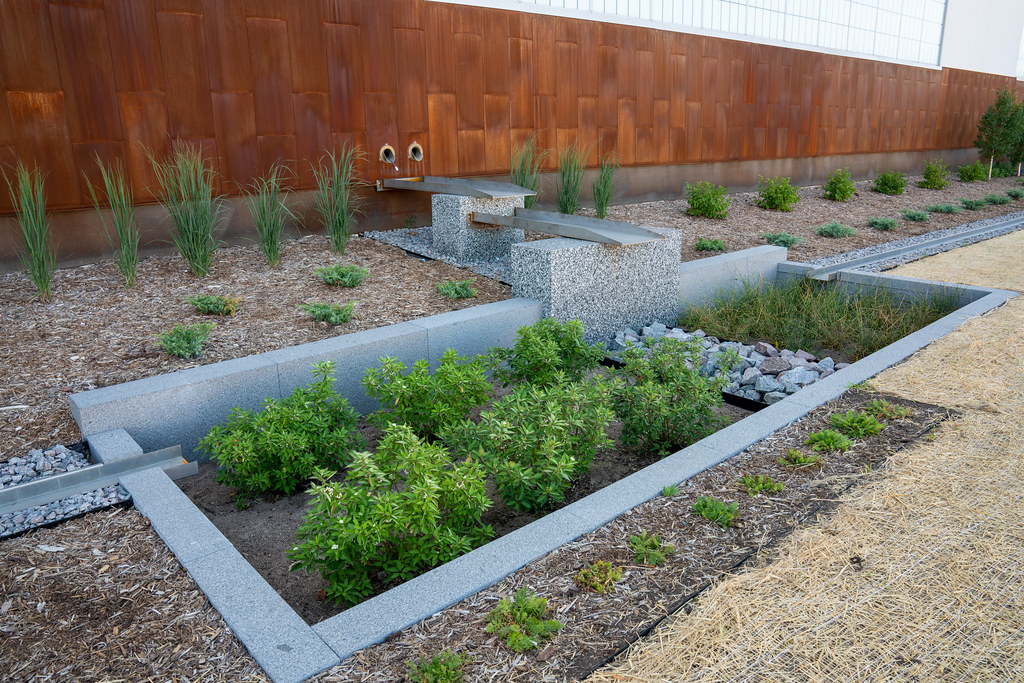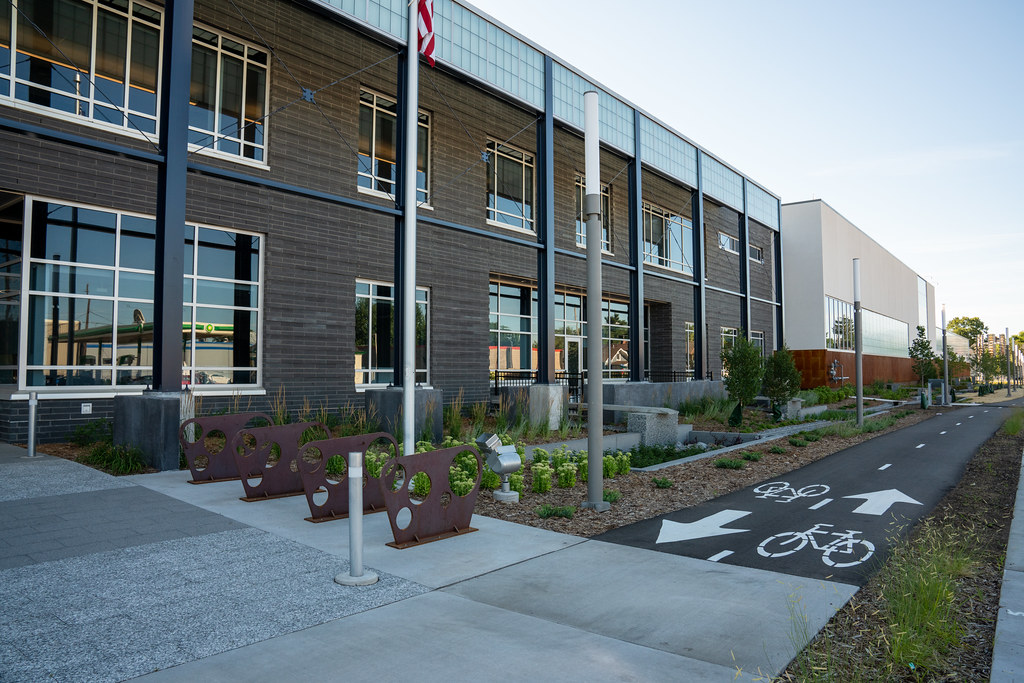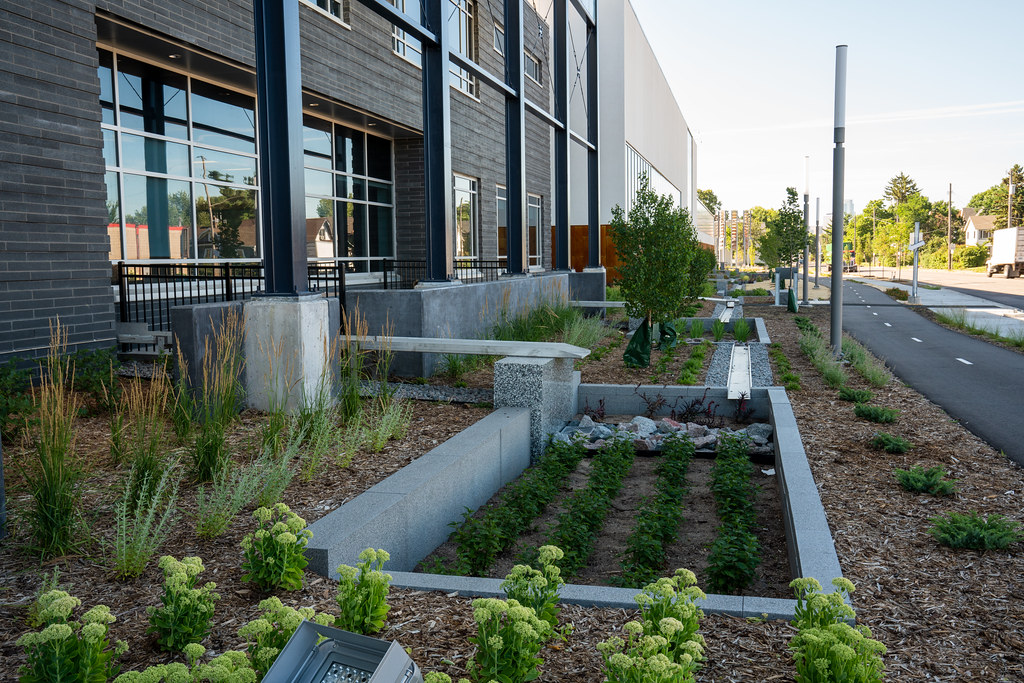Eastside Maintenance Facility
A new City of Minneapolis public works facility features green space and innovative stormwater BMPs.
Project Details
City: Minneapolis
Type: Capital Project Grant
Status: Completed
Timeline: 2018-2020
MWMO Funding: $570,000
Partners: City of Minneapolis; Metropolitan Council
Consultants: HCM Architects; EVS; Floodplain Collective; Loucks
Nancy Stowe
Projects and Outreach Director
612-746-4978
Email Nancy Stowe
View Bio
The MWMO helped the City of Minneapolis incorporate a variety of green infrastructure into its new Public Works facility in Northeast Minneapolis. Located on a 9-acre site in the Holland Neighborhood, the facility incorporates underground and above-ground features that capture and treat polluted stormwater runoff. These stormwater best management practices (BMPs) help protect the nearby Mississippi River as well as provide pollinator habitat and beautification for the neighborhood.
Known as the Eastside Maintenance Facility (EMF), the complex includes a parking ramp, offices, maintenance bays, storage for street maintenance trucks, a fueling island, and a vehicle wash bay. Prior to being redeveloped, the site served as a location for the steel-producing Wheeling Corrugating Company and eight residential parcels. At that time, there was no stormwater management in place; catch basins collected surface runoff and conveyed all of the untreated water via pipe off-site. The MWMO-funded stormwater BMPs will slow water down and prevent pollutants from flowing to the Mississippi River, which is less than a mile from the site.
Contractors installed a series of rain gardens, buffer strips, permeable pavement, and underground infiltration tanks capable of cleaning up to 238,000 gallons of water when it rains (equating to more than six freight trains full of water). The series of rain gardens west of the main building and visible along University Avenue NE are connected via above-ground runnels, providing a treatment train as the pollutants are filtered by the native plants and engineered soil. The rain gardens are also interconnected by a subsurface underdrain with a closed gate valve at the end of the series, allowing for emergency flow to the city stormsewer. Part of the interior of the EMF property is routed to a buffer strip, which filters into drain tile and is routed to an underground rate control tank. This tank consists of a hydraulically connected pipe gallery with 5-foot diameter, perforated, corrugated metal pipes connected by headers. The tank retains and infiltrates stormwater below the primary outlet within 48 hours. The MWMO also funded oil/water separation devices near the fueling station.
The large, southernmost rain garden was partially funded by the Metropolitan Council ($18,400 contributed) and increased the capacity of the treatment train by 45 percent. The selected design team for this project, Hagen Christensen & McIlwain (HCM) Architects, worked with the City of Minneapolis, the Floodplain Collective, and the Holland Neighborhood Improvement Association to obtain neighborhood public input to inform the site plans. The team set goals for the site to be LEED Gold certified, creating an energy-efficient facility with public green space, including an urban orchard along 26th Avenue NE, and walking and biking paths. As part of the City Public Art program, the Public Art Administration selection panel chose Minneapolis Artist Randy Walker to create public artwork for the plaza at the southwest corner of the site.
MWMO funds were also used to install interpretative signage, which describes the BMPs and their role in capturing, cleaning, and infiltrating stormwater. Permeable pavement pathways extending through the bike paths draw visitors towards the signs and seating areas, which are also indicated by a series of illuminated arrow markers. The project provides a unique opportunity to showcase innovative stormwater management not only to those passing by or immediately residing in the area, but to public agency maintenance professionals. MWMO intends to work with the City to provide seminars on maintenance and give detailed field training to City of Minneapolis maintenance employees on site specific stormwater BMPs.


